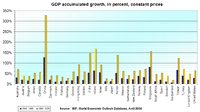
Photo from wikipedia
Greenhouse gases are the major issues globally leading to climate change and increased pollution of the atmosphere. CO2 emissions have divergent effect to the environment that also causes the economic… Click to show full abstract
Greenhouse gases are the major issues globally leading to climate change and increased pollution of the atmosphere. CO2 emissions have divergent effect to the environment that also causes the economic performance of any country. The main motive of this analysis was to expose the influence of CO2 emission on population growth, fossil fuel energy consumption, economic progress, and energy usage in Nepal by using time series data ranging from 1971 to 2019, and data stationarity was checked with the help of unit root tests. An autoregressive distributed lag (ARDL) method with cointegration test was employed to adjudicate the variable dynamics with short- and long-run evidence. Furthermore, variable causality was tested through the Granger causality test. Study findings show that during long-run analysis that fossil fuel energy consumption and energy utilization has constructive affinity with carbon dioxide emission that exposed the p-values (0.0000) and (0.1065) correspondingly, while population growth and economic progress uncovered an inimical relation to CO2 emission. Similarly, the outcomes via short-run analysis also show that fossil fuel energy consumption and energy utilization have productive relation with CO2 emission which shows the p-values (0.0000) and (0.1317), while population growth and economic progress demonstrate an adverse influence to CO2 emission. The causality test results also validate a unidirectional linkage among variables. In attempt to participate in the global fight to clean up the atmosphere, the Nepali government and officials must take new measures to reduce CO2 emissions.
Journal Title: Environmental Science and Pollution Research
Year Published: 2021
Link to full text (if available)
Share on Social Media: Sign Up to like & get
recommendations!